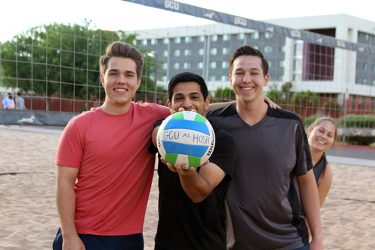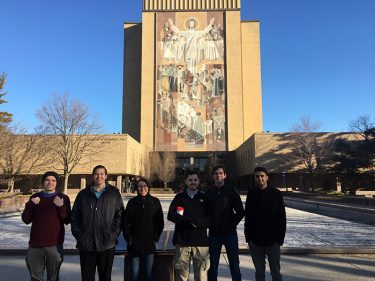
By Lana Sweeten-Shults
GCU News Bureau
If John Varkey’s software engineering dad would have brought him a baseball mitt, things might have turned out differently.
Instead, what was delivered to then 12-year-old Varkey’s hands was an Arduino circuit board, all metal-y and shiny and organized – a little city of pins, voltage regulators and barrel jacks that serves as the brain to a world of things, from everyday objects to more complicated scientific instruments.

It was a good thing, too, that his dad gave him that Arduino board.
Varkey quickly became fascinated, even at 12 years old, with circuits.
“My dad just kind of handed it (the Arduino board) to me. I started messing around and playing with it and was able to create a couple of interesting circuits. I looked at it, and I was like, ‘This is fun. I want to keep doing this.’ And he said, ‘Well, that’s electrical engineering.’”
It’s the field of study that’s leading the recent Grand Canyon University Electrical Engineering graduate down a path he didn’t even know was a possibility – quantum computing.
Varkey will continue to pursue quantum computing as a student at The Graduate School at the University of Notre Dame. He will be heading to the campus in South Bend, Ind., in July, depending on the disruptions of the coronavirus, to start work as a research assistant before classes start in the fall.
He’ll be doing some of that work for Notre Dame’s Electrical Engineering Department under the lead of Professor and Department Chair Gregory Snider. Varkey will be working on the Adiabatic Circuit Project, in which researchers are trying to find a way to reduce how much power a computing system consumes while increasing the amount of computation that can be accomplished in an energy-constrained application.
Getting accepted into the prestigious graduate school was no easy task.
“I’m not going to lie. It was definitely hard,” said Varkey, who honed his academic skills as a home-schooled student in nearby Peoria before choosing to expand his academic horizons at GCU, just like his older brother, Thomas (now a medical student), and his younger brother, Philip, who’s studying electrical engineering in GCU’s College of Science, Engineering and Technology.

The GRE, the test required for admittance to graduate school, was tough, he said. The things you learn as a student – Calculus 2, Calculus 3, differential equations – “You don’t use any of that on the test,” he said.
Varkey also had to work hard to bring his grade point average up to where it needed to be, along with a personal statement and statement of purpose.
The process was something he might not have surmounted if not for the help of his GCU professors, such as Samantha Russell, Electrical Engineering faculty lead, and biomedical engineering professor Dr. Kyle Jones, the advisor for his senior capstone project.
Russell mentioned the University of Notre Dame Graduate School to Varkey and encouraged him to apply. As it turned out, Jones was a post-doc research assistant at Notre Dame before joining the GCU faculty.
“The more I started looking into Notre Dame, the more I got excited because of their facilities," Varkey said, "and when I actually visited, how nice they were to me.”
Varkey, who minored in cybersecurity, didn’t waste time putting himself in the best position for graduate school while he was a student at GCU.
He quickly got involved. In everything.
He was the technology chair and founding member of the Anatomy Club, a founding member and president of GCU’s chapter of the American Scientific Affiliation, the statistical analysis chair and secretary for HOSA-Future Health Professionals and, as a member of the Honors College, he was president of the Honors College student body, secretary for the Honors STEMists and served on the college’s Student Advisory Board.
Varkey also joined GCU’s IEEE chapter for electrical and electronics engineers and worked on the SAE Formula One Team, which designed its first small-scale, Formula One-styled race car in 2019. He landed an internship at ON Semiconductor, too.
Then there's his senior capstone project – a mobility device that helps paraplegic individuals go from a sitting to a standing position.
“By allowing them to have this ability to stand up, it helps them to get the circulation down to their legs and regain some of the dignity they may have lost due to an injury," Varkey said.

“That’s the biggest thing for me – helping (others) has always been something I enjoy.”
But it was in one class, the Science of Solid Materials (STG-242), that he experienced that light-bulb moment.
“One of the technologies that I found interesting was quantum dots, which are used in TVs and are starting to be used in medical applications,” he said. “I found that quantum technology is that push to embrace the issues we encounter in our modern-day circuits. Through the use of quantum technology, I think there is a huge possibility to create better, faster technology that can help in the future.”
Varkey explained quantum computing as the use of quantum-mechanical phenomena, such as superposition and entanglement, to perform computation. These strange phenomena – think electrons that can occupy two places at the same time or particles that exist one second but are gone the next – happen at atomic and subatomic levels. The principles scientists have learned in quantum mechanics are being used to create these powerful ultra computers.
“I would like to be involved in the refinement of these devices by developing processes to make these devices cheaper and easier to use – so research and development is where I would like to go,” he said.
Google is using quantum technology in self-driving cars, for example (researchers believe quantum computing will vastly accelerate how computers learn).
Not only Google but Microsoft and IBM are racing to build these ultra computers, and Varkey wants to be on the front lines.
Considering his interests, a former professor encouraged him to pursue his doctoral degree – something his father always encouraged him to do, too.
“My dad told me that a Ph.D. was the way to go," Varkey said. "And as I gained more experience in college, I realized that my bachelor’s is just a sample.”
Russell said the moment she met Varkey, it was obvious to her that he was intensely interested in research and education. Graduate school seemed to be the next step for him.
“He has a strong drive and is willing to do whatever it takes to accomplish the goal that is set for him,” she said.
Ultimately, Varkey said, “I want to make things better using the science I know."
GCU senior writer Lana Sweeten-Shults can be reached at [email protected] or at 602-623-7901.
Related stories
GCU Today: First GCU engineering grads helped build program
GCU Today: Electrical engineering technology students still wired in
GCU Today: Engineering, tech students showcase their ingenuity















